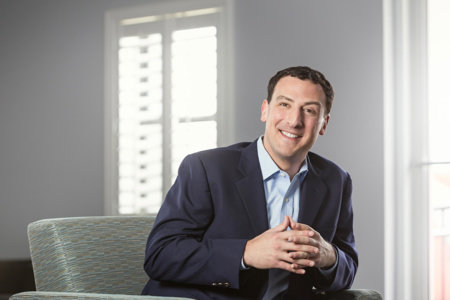Isaac Lidsky has been living quite the varied life. In the early 1990s, he played the role of “Weasel” on Saved by the Bell: The New Class; later graduated from Harvard College at age nineteen with a degree in mathematics and computer science; graduated from Harvard Law School magna cum laude; served as a law clerk for Supreme Court Justices Sandra Day O’Connor and Ruth Bader Ginsburg; argued more than a dozen appeals in federal court on behalf of the United States and never lost a case; started a tech company that sold for $230 million; transformed a struggling $15 million concrete subcontractor into an industry-leading $150 million construction services company in five years; and founded Hope for Vision, a nonprofit organization that funds the development of treatments and cures for blinding diseases. That last item was inspired by Lidsky’s own experience, having been born with Retinitis Pigmentosa, a rare degenerative disease of the retina that led to blindness. Here, Florida-dwelling author and entrepreneur Lidsky answers a few questions about his life and how blindness factored into it.
PENGUIN RANDOM HOUSE:How did going blind end up helping you, instead of hindering your ability to see how much more you could achieve in a career with a remarkable number of accomplishments?
ISAAC LIDSKY: What we see feels like “truth” – something out there that is objective reality, factual; universal. But as my eyes progressively deteriorated, I literally saw firsthand that the experience of sight is altogether different. It is a unique, personal, virtual reality that is constructed in the brain, and it involves far more than our eyes. I began to search for other ways in which I was misperceiving as objective “truth” the beliefs and assumptions that were, in reality, creations of my own making – creations I could change. This was the “eyes wide open” vision that enabled me to take control of my reality and my destiny.
PRH:What was your primary motivation to write Eyes Wide Open?
IL: When I was diagnosed with my blinding disease, I knew it would ruin my life. But I was wrong. While I lost my sight, I gained the vision to define and create the life I want for myself. It turned out to be a profound blessing, one that I want to share with others so they, too, can make use of these insights.
PRH:What are some signs that many people today can’t (or don’t) see clearly?
IL: I think the test is simple: What are the differences between the way you’d like to live your life and the way you actually live it – the differences in terms of who you are, your career, how you treat others, how you allow others to treat you, how you spend your time, and what you accomplish? If those things are different and you aren’t doing anything about it, you’re not seeing your life very clearly.
PRH:What kind of vision is essential for people to reclaim their most meaningful senses?
IL: Clarity of vision demands that you are absolutely honest with yourself and accountable to yourself – for your thoughts, beliefs, opinions, actions. We do ourselves great harm when we lie to ourselves. It’s even worse, though, when we avoid facing ourselves altogether. I think introspection is a neglected skill that is critical.
PRH:Can you explain how we can reframe our fears as fiction, and offer any suggestions for those who may feel confined by their fears or circumstances?
IL: You are lulled into playing your part in the awful reality of your fears by perceived heroes and villains. This is how our fears become self-fulfilling – when we abdicate responsibility, blaming and celebrating others. Look for heroes and villains in your life. They’re figments of your imagination. You are the creator of your reality. You and only you.
PRH:How did you reshape your reality and hone your life goals and vision (how your personal vision seemed to grow progressively sharper, even as your eyesight diminished, as discussed in your recent TED Talk)?
IL: My experience losing my sight was a peek behind the curtains into the power of the mind to shape our realities. Eyes wide open is a discipline that takes effort and practice, and I’m far from perfect. But I’m one thousand percent committed to the idea that I alone bear responsibility for my life, in every moment. Once you get there, the rest is straightforward.
PRH:What has been the most surprising discovery from your life’s experience (i.e., learning and building a career and setting goals while adjusting to blindness)?
IL: I’ve been tremendously surprised, and pleased, to see how losing my sight has been a blessing in so many ways in my life. In the grip of visceral fear when I was diagnosed, I could not have imagined that I would feel grateful for the experience. Grateful because blindness gave me my eyes wide open vision, and because it has brought me great rewards in so many ways in my career and personal life.











